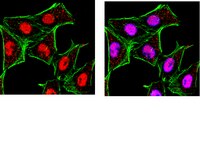09-843 Sigma-AldrichAnti-SIRT2 Antibody
Use Anti-SIRT2 Antibody (Rabbit Polyclonal Antibody) validated in WB, IP to detect SIRT2 also known as SIR2-like protein 2, silent information regulator 2, sirtuin 2.
More>> Use Anti-SIRT2 Antibody (Rabbit Polyclonal Antibody) validated in WB, IP to detect SIRT2 also known as SIR2-like protein 2, silent information regulator 2, sirtuin 2. Less<<Recommended Products
Overview
| Replacement Information |
|---|
Key Spec Table
| Species Reactivity | Key Applications | Host | Format | Antibody Type |
|---|---|---|---|---|
| H, M | WB, IP | Rb | Affinity Purified | Polyclonal Antibody |
| References |
|---|
| Product Information | |
|---|---|
| Format | Affinity Purified |
| Control |
|
| Presentation | Purified rabbit polyclonal in buffer containing 0.1 M Tris-Glycine (pH 7.4), 150 mM NaCl with 0.05% sodium azide. |
| Quality Level | MQ100 |
| Physicochemical Information |
|---|
| Dimensions |
|---|
| Materials Information |
|---|
| Toxicological Information |
|---|
| Safety Information according to GHS |
|---|
| Safety Information |
|---|
| Storage and Shipping Information | |
|---|---|
| Storage Conditions | Stable for 1 year at 2-8°C from date of receipt. |
| Packaging Information | |
|---|---|
| Material Size | 100 µg |
| Transport Information |
|---|
| Supplemental Information |
|---|
| Specifications |
|---|
| Global Trade Item Number | |
|---|---|
| Catalogue Number | GTIN |
| 09-843 | 04053252478468 |
Documentation
Anti-SIRT2 Antibody SDS
| Title |
|---|
Anti-SIRT2 Antibody Certificates of Analysis
| Title | Lot Number |
|---|---|
| Anti-SIRT2 | 2470935 |
| Anti-SIRT2 - 2121789 | 2121789 |
| Anti-SIRT2 - 1987093 | 1987093 |
| Anti-SIRT2 - 2039824 | 2039824 |
| Anti-SIRT2 - 2070426 | 2070426 |
| Anti-SIRT2 - 2148300 | 2148300 |
| Anti-SIRT2 - 2197278 | 2197278 |
| Anti-SIRT2 - 2266746 | 2266746 |
| Anti-SIRT2 - 2329803 | 2329803 |
| Anti-SIRT2 - 3890525 | 3890525 |










